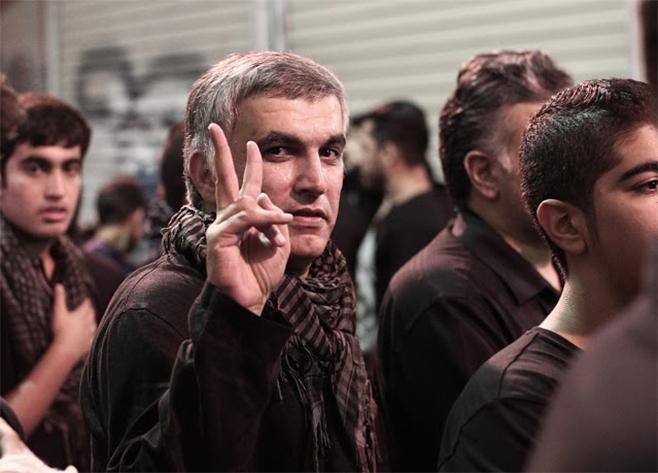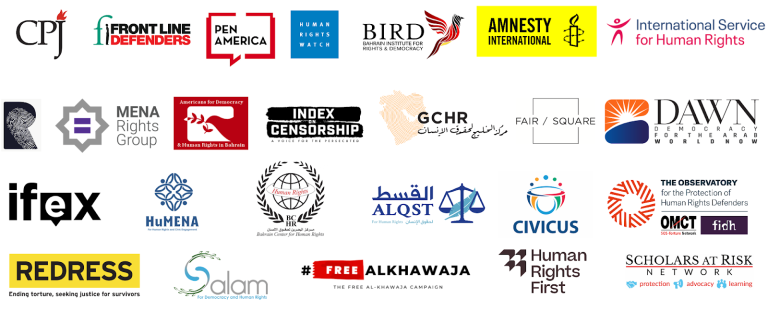15 May 2017 – Nabeel Rajab faces trials for speaking to journalists and tweeting this week, days after the UN’s top anti-torture experts called for his “release from detention”. Rajab, who is currently detained in hospital after poor treatment by authorities, faces up to 18 years in prison for speaking his mind.
The President of the Bahrain Center for Human Rights has been in police custody for 11 months, most of it under solitary confinement. His health has worsened in his nearly year-long detention. In early April, Rajab underwent surgery for bleeding ulcers. He was discharged from hospital back into police custody contrary to medical advice, and was re-admitted into hospital days later. During his detention, Rajab has undergone two operations, suffered two bouts of heart palpitations that require emergency medical care, and has developed other medical conditions, including a low white blood cell count and depression, Human Rights Watch reports.
The Bahrain Institute for Rights and Democracy (BIRD) spoke to Rajab’s family, who state that his lawyers have not had full access to Rajab in hospital and that his surgical wound was infected because he was discharged from hospital into a dirty police station cell. The Bahrain Embassy in London claims that Rajab’s access to healthcare is being met adequately.
The UN Committee Against Torture, the top expert body on the subject, on Friday called on Bahrain to end Rajab’s solitary confinement and provide him with medical assistance and redress. The Committee expressed concerns “about the solitary confinement of Mr. Nabeel Rajab which is reported to have exceeded nine months and during which he has been denied adequate medical care”, which it says may amount to torture.
The Committee further called for the “release from detention human rights defenders and journalists who are imprisoned and in detention allegedly in retaliation for their work, including” Nabeel Rajab.
Sayed Ahmed Alwadaei, Director of Advocacy, BIRD: “Nabeel Rajab is being treated as a criminal for exposing the scale of torture which Bahrain’s authorities have committed. His findings have now been confirmed by the UN’s top torture body. Bahrain’s punishment of critics of torture would not happen without the green-light from its allies Washington and London. Nabeel Rajab must be freed if Bahrain is to respect its international obligations.”
The Committee’s report described torture as “widespread” in Bahrain. As well as Nabeel Rajab, the committee called for the release of human rights defenders Abdulhadi Al-Khawaja, Naji Fateel, Abduljalil Al-Singace, Hussain Jawad and Abdulwahhab Hussain. They called for the re-trial of Mohammad Ramadan and Husain Moosa, two torture victims who are sentenced to death and may be executed imminently. Bahrain signed the UN Convention Against Torture in 1998.
16 May Trial: Speaking to journalists, facing 3 years
Nabeel Rajab is charged with “spreading false news” and faces three years for telling news outlets that journalists and NGOs are barred from entering Bahrain (Media Interviews Case). Policies of barring critics from entry continue to the present: last week, Human Rights Watch and a freelance journalist were both denied entry into Bahrain, which played host to the FIFA World Congress.
The trial date was postponed twice: having been initially set for the day of the Formula 1 Grand Prix (16 April), it was first postponed to World Press Freedom Day (3 May), and then to this week. Tomorrow will be the sixth court hearing in the case.
17 May Trial: Criticising war crimes and exposing journalists, facing 15 years
Rajab is being tried for tweeting anti-war messages and exposing torture in Bahraini prisons, and faces 15 years in prison.
His charges are “spreading rumours in wartime”, “insulting a neighbouring country” and “insulting a statutory body”. The first two charges relate to Rajab’s criticism on twitter of the Saudi war in Yemen and the humanitarian costs of the war. The latter concerns his exposure of torture in Bahrain’s largest prison.
The trial has had eleven hearings thus far, the last on 22 March 2017. The twelfth hearing for the long-running trial will be held on Wednesday 17 May.
Other cases
Rajab has a third case against him of “spreading false news”, in relation to a letter from jail he wrote to the New York Times in September 2016. This has not gone to trial. He was interrogated in December 2016 for writing to the French outlet Le Monde.
In all, Rajab currently faces 18 years in prison for exercising his freedom of expression.





